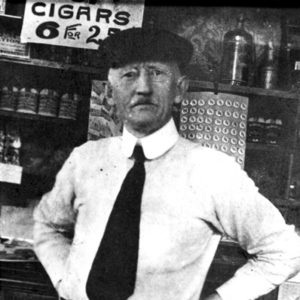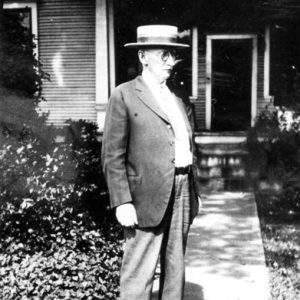calsfoundation@cals.org
Tom Perkins Morgan (1864–1928)
Tom Perkins Morgan’s gravestone in the Rogers Cemetery says simply, “Writer, Humorist, Philosopher.” To many in Rogers (Benton County), he was best known as a successful local businessman who operated a newsstand and bookstore downtown. But Morgan was a nationally known writer whose work appeared in major publications such as Life and the Saturday Evening Post.
Tom P. Morgan was born on December 1, 1864, in East Lyme, Connecticut, to Joseph P. Morgan and Mary A. Perkins Morgan. He moved with his parents and his only sibling, Harry, to Garnett, Kansas, when he was ten. He grew up there, spending much of his spare time in the local newspaper office. In his youth, Morgan was something of an adventurer. He clerked in a grocery store, but he also joined a traveling dramatic company and signed on with a circus. These varied life experiences were the basis of much of his writing. By 1887, Morgan was a published author.
In 1890, Morgan moved to Rogers with his parents and brother Harry. Within a few years, his stories on “hillbilly” life and odd people were appearing in the Philadelphia Post, Country Gentleman, Frank Leslie’s Illustrated Newspaper, Life, Ladies’ Home Journal, and Puck. By 1912, he was a regular columnist for the Kansas City Star, and he continued to write for that newspaper until shortly before his death, sometimes using the pen name Tennyson J. Daft. Among his famous characters were J. Fuller Gloom, Gap Johnson and his fourteen children of Rumpus Ridge, Constable Slackputter, and Jig Fiddlin’ of Clapboard Springs.
Morgan opened the Post Office Book Store in 1893. The business sold school books, periodicals, cigars, and a large line of area postcards. The store was an ideal place to meet much of the area population. Morgan became acquainted with Jay B. Iden, another local author who also wrote for Country Gentleman magazine. He also became friendly with Betty Blake and her admirer and future husband, Will Rogers. Although Morgan was not a churchgoer, another special friend was the evangelist John Brown, founder of John Brown University in Siloam Springs (Benton County). According to his obituary in the Rogers Democrat, Morgan always had a soft spot for the underdog, and he admired Brown because his university made it possible for many poor boys and girls to go to college.
The bookstore was also the ideal place for Morgan to gather inspiration for his stories. He kept a little notebook there where he recorded local sayings and funny tales. From this notebook, he gathered material for his humorous tales told in Ozark vernacular. In 1918, Morgan sold the bookstore in order to concentrate entirely on his writing.
While he was friendly with many, Morgan had few intimate friends. He never married, once saying that he already had “a phonograph and a mean disposition, so what would I want with a wife?” He spent most of his time alone writing, often late into the night.
Five years before his death, Morgan suffered a severe stroke. Neighbor Vera Key, a trained nurse, cared for him during his recovery, and he came to regard her as a daughter. Morgan never fully recovered from that first stroke, and he had a second one in 1928. Key returned to Rogers to care for him in his home. He died soon after on July 7, 1928.
Morgan left a few minor bequests to distant relatives, but he willed his house, the rest of his estate, and his collection of writings to Vera Key in gratitude for her friendship and care.
For additional information:
Jines, Billie. “Mystery of Tom P. Morgan is Resolved.” Northwest Arkansas Morning News. May 3, 1987, p. 1B.
Key, Vera. “Memories of Tom P. Morgan.” Benton County Pioneer 1 (August 1956): 8–10.
Obituary of Tom P. Morgan. Rogers Democrat. July 12, 1928, p. 1.
Tom P. Morgan Research File. Research Library. Rogers Historical Museum, Rogers, Arkansas.
Gaye Bland
Rogers Historical Museum
 Literature and Authors
Literature and Authors Post-Reconstruction through the Gilded Age, 1875 through 1900
Post-Reconstruction through the Gilded Age, 1875 through 1900 Tom Morgan
Tom Morgan  Tom Morgan
Tom Morgan 




Comments
No comments on this entry yet.